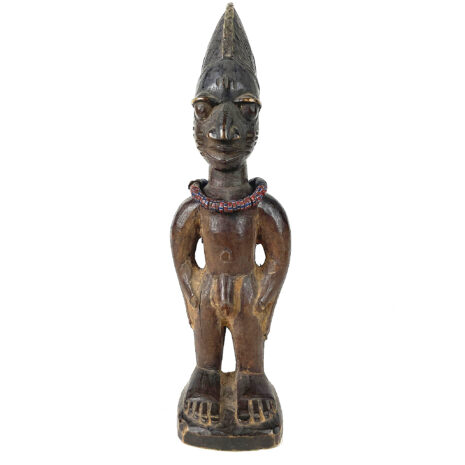Vintage Carved Ibeji with Necklace, Africa, Nigeria Yoruba #1964)
Original price was: $475.00.$325.00Current price is: $325.00.
H: 9.625″ W: 3″ D: 3″ | FREE SHIPPING WITHIN CONTINENTAL U.S.!
This vintage Ibeji portrays a simple yet strong elegance with his characteristic large conical head, long curved neck and elaborately striated hairstyle. His extremely large round bulging eyes under heavy lids, flaring nose, full lips, and large flat ears reflect the Yoruba idealized form of beauty and exemplify being a correct and upstanding example of tribal values. His prominent genitalia and buttocks and his sturdy vertical stance on wide feet, thick legs and strong rounded shoulders and arms symbolize his strength and fertility. He wears a necklace with traditional Yoruba blue and multi colored beadwork. This vintage statue is finely carved with a smooth patina.
Description
One of the three largest ethnic groups in Nigeria, Benin and Togo numbering over 20 million, Yoruba are among the most skilled African craftsmen. Traditional Yoruba religion has a complex hierarchy of deities comprised of a supreme creator with some 400 lesser gods and spirits. Having one of the world’s highest rates of twin births but a high mortality rate, the Yoruba in West Africa have developed a “twin cult” revering deceased twin(s) as potent spirits, calling them ere Ibeji and honoring them with carved images to access their spirits and souls after death. Ere Ibeji identical twin carvings signifying the “unity in duality” that symbolized the twins. They reflect three significant Yoruba traditions: the importance of twins, a strong belief in the afterlife, and their idealized form of beauty and being a righteous example of a Yoruba. Small for ease of handling and usually made of rubber tree wood due to its fine grain, density and mystical power associated with it, when rubbed with oil, it resulted in a fine patina. Mothers of the deceased commissioned village carvers, often trained priests, to craft spiritual representations of the twin who died to serve as vessel or resting place to contain the deceased twin’s spirit. Never portrayed as children, they were depicted as the ideal of Yoruba beauty in the prime of life. Carvings emphasize an elaborate hairstyle on a conical head where one’s spirit, intelligence and the seat of divine power lie, round eyes and facial features and a balanced body with each feature symbolizing the moral virtue and inner goodness that should be cultivated by all children. The figures were usually placed in a home altar in the living quarters dedicated to Eshu (Elegba), a significant benevolent protective spirit and messenger between heaven and earth. Mothers ritually feed, wash and clothe them daily and offer prayers, sacrifices and spiritual care. In the past five decades demand for Tribal Art hand carved commissioned Ibeji’s has diminished, and since the 1970’s preferences have switched to purchasing manufactured, imported doll, and photographs instead of wood figures.
Sources
Africartmarket Today, Yoruba Ere-Ibeji, 2022.
Dr. Peri Klemm, Ere Ibeji Figures (Yoruba peoples), Khan Academy.
Additional information
| Weight | 3 lbs |
|---|---|
| Dimensions | 12 × 9 × 6 in |
| Period | Vintage (1920-1980) |
| Date | 1940-1950 |
| Materials and Technique | Wood |
| Dimensions (inches) | Ht: 9.625” W: 3” D: 3” |
| Dimensions (metric) | Ht: 24.45cm W: 7.62cm D: 7.62cm |
| Weight | 7.1oz |
| Condition | Excellent, fine patina demonstrating age and use |
| Item Number | 1964BHA |
| Shipping Box Size |










